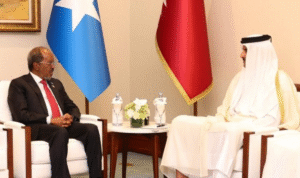In a surprising diplomatic maneuver, regional leaders from Somalia have engaged in talks with Abu Muhammad al-Julani, the leader of the Syrian militant group Hayat Tahrir al-Sham (HTS). The discussions are reportedly aimed at exploring potential strategies for countering extremist threats in the Horn of Africa region.
These meetings, held behind closed doors, underscore a dynamic shift in geopolitical alliances, as Somalia seeks to enhance its security measures against insurgent groups like Al-Shabaab. Al-Julani, previously linked with Al-Qaeda, has been a pivotal figure in Syria’s insurgency, and his group’s expertise in asymmetric warfare appears to be of particular interest to Somali officials.
Sources familiar with the talks, who requested anonymity due to the sensitive nature of the discussions, emphasized that Somali leaders are not aligning with HTS ideologically. Instead, they are keen to understand operational tactics and counter-terrorism strategies that may be applicable against insurgents threatening Somalia’s security and stability.
Political analysts point out that such engagements could be part of a broader strategy by Somalia’s government to diversify its alliances and leverage unconventional partnerships to combat growing threats from domestic terror outfits. Somalia’s leaders have historically partnered with traditional allies, but the persistent challenges posed by Al-Shabaab have necessitated looking beyond conventional frameworks.
While these talks might raise eyebrows internationally—particularly given HTS’s controversial standing—Somalia’s priorities remain focused on safeguarding its sovereignty and ensuring peace within its borders. Reports suggest that Somali intelligence is keen on extracting value from al-Julani’s experiences in border security and counter-insurgency operations.
AQRI.net reached out to Somali government officials for a statement on these developments, but responses were not immediate. Meanwhile, experts caution that dialogues of this nature need to be approached with a keen understanding of the complex web of alliances and hostilities that govern regional and international relations.
The world will be watching closely as Somalia navigates these turbulent waters, hoping to strike a delicate balance between benefiting from these new dialogues and not alienating its traditional allies or contravening international norms. As the threat landscape evolves, Somalia’s diplomatic playbook continues to adapt, reflecting shifting sands in a confluence of conflicts that is as intricate as it is unpredictable.







Comment